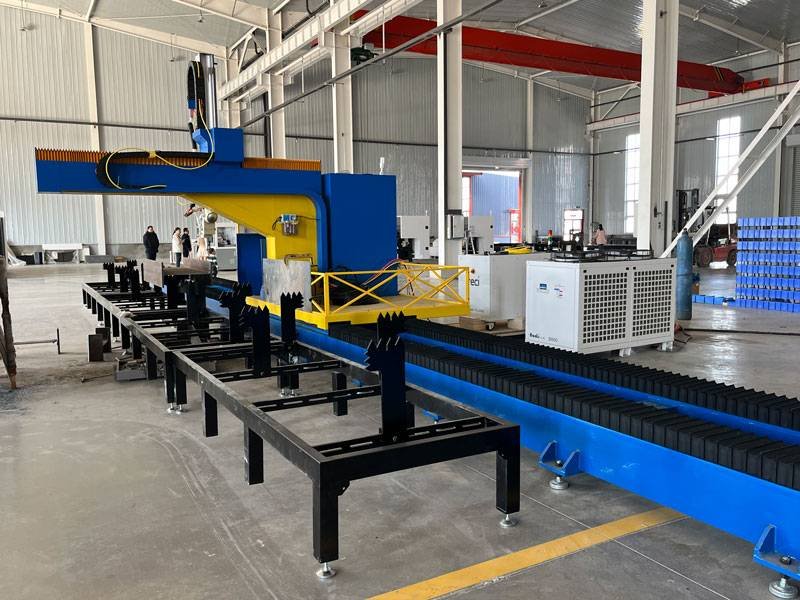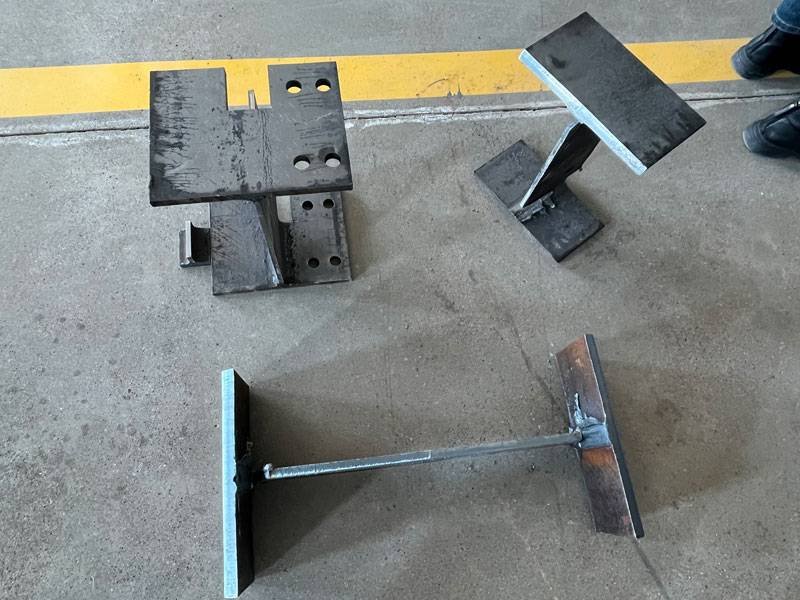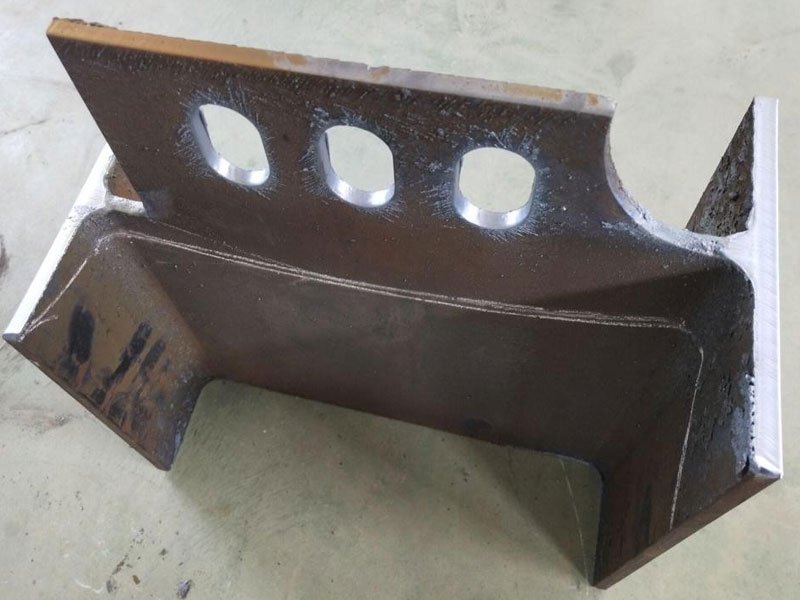Welcome to the ultimate guide to the open section on laser cutting ! Whether you are an experienced professional in the manufacturing industry or a curious individual looking to delve deeper into universal laser tube technology, this blog post will take you deep into the world of laser cutting.
What Is Open Section Laser Cutting Machine
Open Section Laser Cutting ( Beam Steel Structural Laser Cutting Machine, Angle, Channel Laser Cutting/H Shape Steel Structure Laser Cutting ) is a highly versatile and efficient method for cutting and shaping open-section steel pipes. By utilizing laser technology and numerical control equipment, this process enables precise and complex cuts to be made quickly and accurately.
The ability to cut, drill, and rotate the pipes in batches allows for increased productivity and superior quality in the final products. Overall, Open Section Laser Cutting is a valuable tool for industries that require precise and efficient cutting of open section pipes.
Components of Open Section Laser Cutting
The components include: a fiber laser, 3D 5axis laser cutting head, feeding mechanism, feeding roller, feeding trolley, and hydraulic clamps and other laser cutter attachments.

Open Section Laser Cutting Machines Loading device
The feeding mechanism described consists of several key components that work together to efficiently transfer materials in a manufacturing process. The system is designed to streamline the loading and unloading process and ensure the materials are properly positioned for further processing.
- Moving Machines: These machines, consisting of lifting mechanisms, transmission chains, oil cylinders, and conveyor motors, form the material transfer system. They are responsible for loading and unloading the materials in an organized manner.
- Feed Roller Table: Raw materials are lifted by the loading mechanism and sent to the feed roller table through a hydraulic motor. The feed roller table helps to keep the materials in a horizontal position as they move toward the cutting station.
- Feeding Trolley: This component is crucial for feeding positioning and clamp height positioning. It consists of linear guide rails, gears, racks, finishing beams, and a trolley chassis driven by servo motors. With the help of photoelectric sensors, the feeding trolley can detect material connections and optimize the feeding process for increased efficiency.
- Hydraulic Clamp: The hydraulic clamp plays a vital role in automatically clamping and loosening the section steel. It includes lower and upper jaws that move forward and backward through the oil cylinder, driving the middle plug plate to slide and secure the material in place. Overall, the feeding mechanism described integrates various mechanical and hydraulic components to facilitate the smooth transfer and positioning of materials in a manufacturing setting, enhancing productivity and accuracy in the production process.
Open Section Laser Cutting Can Cut Materials
The special laser cutting system for section steel can handle different types of section steel, such as H-section steel, I-beam and channel steel. The machine should be able to perform various tasks such as cutting, hole cutting, locking, beveling, marking and scoring. Steel laser cutting machine is your ideal choice on the market today.
CNC (computer numerical control) machines are programmable and can perform multiple tasks with high precision and efficiency. The machines can read Tekla steel structure 3D modeling data files, allowing precise cuts to be made to design specifications.

Advantages of Beam Steel Structural Laser Cutting Machine in Manufacturing
- Software Compatibility: The machine is compatible with Tekla, CAD, and 3D3S software, enabling seamless integration with various design and modeling programs.
- File Export and Code Generation: Supports Tekla software for file export and batch code generation, streamlining the production process.
- Precision Cutting Features: Offers various cutting capabilities such as bevel cutting, profile docking, weld control, hole installation, and thread processing to ensure high product quality and aesthetics.
- Collision Avoidance: Equipped with a cutting gun anti-collision function to prevent accidents and ensure operational safety.
- Programming Methods: Provides both online and offline programming options for flexibility in creating cutting programs.
- Précision de coupe: Delivers high cutting accuracy, verticality, minimal deformation, small gaps, and the ability to cut intricate designs and sharp angles.
- Fast Cutting Speed: Offers significantly faster cutting speeds compared to plasma cutting, particularly for carbon steel and stainless steel materials.
- Smooth Cutting Section: Produces smooth, burr-free cuts that eliminate the need for additional finishing processes.
- Low Consumable Costs: The machine’s consumables cost less than those of plasma cutting systems, contributing to cost savings.
- Non-Contact Cutting: Utilizes non-contact cutting methods, resulting in minimal heat conduction and lower maintenance costs compared to plasma cutting.
- Environmentally Friendly: Generates minimal smoke, dust, and harmful gases during cutting, making it more environmentally friendly. Overall, this laser cutting machine appears to offer advanced features, high efficiency, cost-effectiveness, and environmental benefits compared to traditional cutting methods like plasma cutting.
Laser Cutting Open Section Applications
Steel structure laser cutting machine is a common steel structure processing equipment that can be used to process various steel plates and steel pipes quickly and accurately.
It is widely used in modern buildings, bridges, rail transit, ships and other fields.
How to Maintain Steel Structure Laser Cutting Systems
Thank you for providing the daily maintenance content for a laser cutting machine. It’s important to follow these guidelines to ensure the machine operates efficiently and safely. Here are some precautions to keep in mind while performing the daily maintenance:
- 1. Handle the protective lens with care to avoid scratching or damaging it.
- 2. Use a soft, lint-free cloth to clean the protective lens to prevent scratches.
- 3. Check the cooling water system for any leaks or blockages that could affect the performance of the laser.
- 4. Use the recommended oil for the laser vacuum pump and ensure it is at the correct level.
- 5. Inspect the oil, water, and gas lines regularly for any signs of wear or damage.
By following these precautions and performing daily maintenance tasks diligently, you can prolong the life of your laser cutter laser and maintain its performance.

FAQ
How accurate is the h steel laser cutting machine?
The cutting accuracy is high, and the hole spacing accuracy can be achieved as high as 1mm;
The laser control system can detect profile deformation and repair errors within 3mm;
How to choose budget universal laser cutter section steel
When choosing a budget laser cutter services to cut steel, you need to consider the following factors:
Material capabilities:
Metal Type: Budget laser cutters typically use CO2 lasers, which are suitable for thin carbon steel (approximately 0.5mm to 6mm).
Cutting Thickness: Determine the maximum thickness of the steel sections you will need to cut regularly.
Laser power and cutting speed:
Higher laser power allows cutting of thicker steel.
Cutting speed is critical to productivity.
Working area size:
This determines the size of the section you can cut in one go.
Additional features:
- Air assist: removes smoke and debris during cutting, resulting in cleaner cuts.
- Honeycomb Cutting Table: Supports metal sheets and allows smoke to escape, improving cut quality.
Brand reputation and after-sales support:
Look for established brands with good customer reviews and reliable after-sales support.
Choosing a budget cutter depends on your specific needs.
Can laser be used to cut thin sections of stone?
Yes, lasers can be used to cut thin sections of stone. There are even specific laser cutters designed for stone cutting. Cannot be cut using Laser Cutting Open Section.
What is a way to check the cutting quality of a laser cutting machine?
There are two main approaches to checking the cutting quality of a laser cutting machine: visual inspection and dimensional measurement.
Visual Inspection:
- Roughness: Examine the cut edge for vertical lines. Shallower lines indicate a smooth cut, while deep lines mean a rougher cut that may require additional finishing.
- Verticality: For cuts in thicker materials (typically exceeding 10mm), check how close the edge is to perfectly vertical. A wider kerf at the top or bottom indicates the laser focus might be off-center.
- Dross: Look for minimal dross, which is melted material clinging to the cut edge. Excessive dross suggests needing adjustments to laser power, cutting speed, or assist gas pressure.
- Zone affectée par la chaleur (ZAT) : The laser beam can heat the material slightly around the cut, potentially causing discoloration or warping. A minimal HAZ is ideal.
- Striation Marks: These are fine lines or ripples on the cut surface. While not necessarily a dealbreaker, excessive striations can affect the aesthetics and functionality of the cut part.
- Warping: The heat from the laser can cause the material to warp slightly, especially for thin sheets.
Dimensional Measurement:
- Cutting Width: Measure the width of the kerf (the slot left by the laser cut) to ensure it meets your required tolerances. A thinner kerf allows for greater precision, especially for intricate designs.
- Part Accuracy: Use calipers or a coordinate measuring machine to check the dimensions and geometry of the cut part for accuracy compared to the original design.
